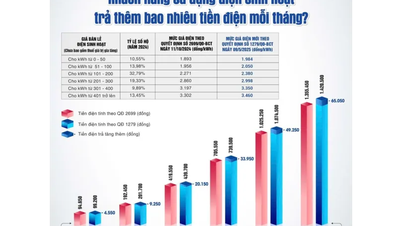Authorized by the Prime Minister, Minister of Home Affairs Pham Thi Thanh Tra has just signed the Government's report to the National Assembly on the implementation of a number of resolutions of the 14th National Assembly on thematic supervision and questioning and resolutions of the National Assembly on thematic supervision and questioning from the beginning of the 15th term to the end of the 4th Session in the field of Home Affairs.
In the report, regarding the salary sector, the Minister of Home Affairs said that, implementing Resolution No. 27-NQ/TW of the 7th Central Conference, 12th tenure; Conclusion No. 20-KL/TW of the 4th Central Conference, 13th tenure on socio-economic development in 2021 - 2022 and Resolution No. 75/2022/QH15, Resolution No. 101/2023/QH15, the Government reported to the Government Party Committee to report to the Central Executive Committee and the National Assembly on the results and roadmap for reforming salary policies for cadres, civil servants, public employees, armed forces and employees in enterprises.
The Government has proposed a roadmap for salary reform for cadres, civil servants, public employees and armed forces with 6 reform contents according to Resolution No. 27-NQ/TW (expected to be implemented from July 1, 2024), including:
1- Build 5 new payroll tables;
2- Allowance regime;
3- Bonus mode;
4- Salary increase regime;
5- Funding sources for implementing salary regime;
6- Salary and income management.
According to the report, after 2024, wages will continue to be adjusted to compensate for inflation and will be somewhat improved according to GDP growth until the lowest wage is equal to or higher than the lowest wage of region I (the highest region) of the business sector.
The report stated that based on the conclusion of the competent authority on the salary policy reform roadmap, the Government will report to the Party Committee to submit to the Politburo for consideration and decision on the specific contents of the new salary regime.
From there, competent authorities will issue documents specifying the new salary regime for subjects under their management authority.
Regarding this information, many people wonder whether pensions will increase when implementing salary reform in 2024.
Pursuant to Article 7 of Decree 115/2015/ND-CP, pension calculation for retirees participating in compulsory social insurance (SI) is carried out according to the following formula:
Monthly pension level = Monthly pension rate (%) X Average monthly salary for social insurance contribution.
Accordingly, in the case that the 2024 salary reform increases the salary of social insurance participants: If a social insurance participant retires after the salary reform and has previously received the new salary, then upon retirement, the average monthly salary for social insurance contributions of that person will also increase.
Because the pension level is calculated from the average monthly salary for social insurance contributions and the pension rate, if the regulations on pension rates do not change, when the average monthly salary for social insurance contributions increases, the pension level will also increase.
Thus, social insurance participants will have their pensions increased if salary reform increases their salaries.
The condition to receive an increase in pension when reforming salary in 2024 is that social insurance participants must retire after the salary reform and have had a period of time receiving the new salary increase compared to before.
Currently, there is no official decision on whether or not to increase pensions when the salary reform is expected in 2024. However, with the above analysis, this is still good news for millions of workers and pensioners.
Minh Hoa (t/h)
Source


![[Photo] General Secretary To Lam arrives in Minsk, begins state visit to Belarus](https://vphoto.vietnam.vn/thumb/1200x675/vietnam/resource/IMAGE/2025/5/11/76602f587468437f8b5b7104495f444d)

![[Photo] General Secretary To Lam meets and expresses gratitude to Vietnam's Belarusian friends](https://vphoto.vietnam.vn/thumb/1200x675/vietnam/resource/IMAGE/2025/5/11/c515ee2054c54a87aa8a7cb520f2fa6e)
![[Photo] General Secretary To Lam concludes visit to Russia, departs for Belarus](https://vphoto.vietnam.vn/thumb/1200x675/vietnam/resource/IMAGE/2025/5/11/0acf1081a95e4b1d9886c67fdafd95ed)




























![[Photo] National Assembly Chairman Tran Thanh Man attends the Party Congress of the Committee for Culture and Social Affairs](https://vphoto.vietnam.vn/thumb/1200x675/vietnam/resource/IMAGE/2025/5/11/f5ed02beb9404bca998a08b34ef255a6)






























































Comment (0)